Module 7 Unit 3 Language in use 复习课件 (共20张PPT无素材)
文档属性
| 名称 | Module 7 Unit 3 Language in use 复习课件 (共20张PPT无素材) | 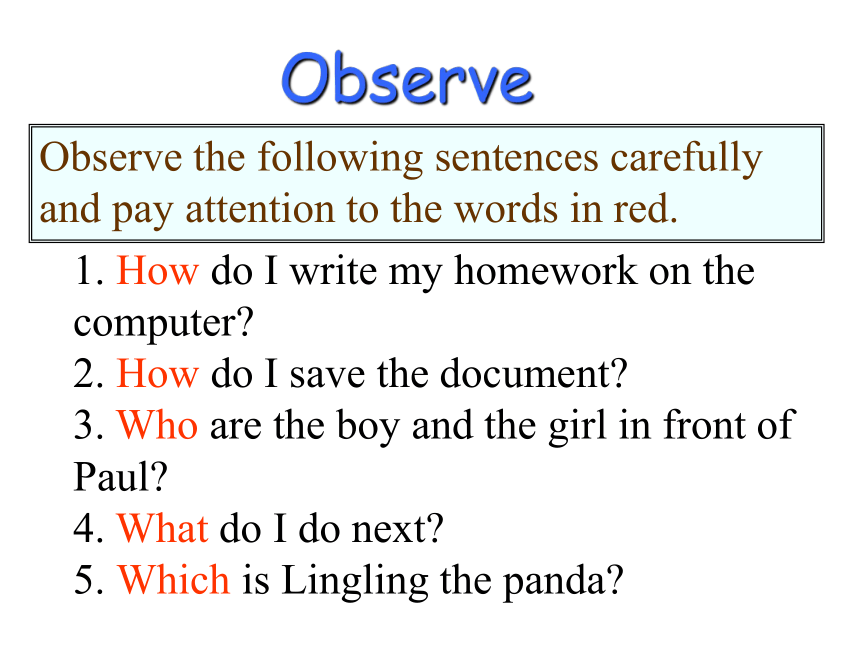 | |
| 格式 | zip | ||
| 文件大小 | 504.0KB | ||
| 资源类型 | 教案 | ||
| 版本资源 | 外研版 | ||
| 科目 | 英语 | ||
| 更新时间 | 2019-11-03 16:15:35 | ||
图片预览

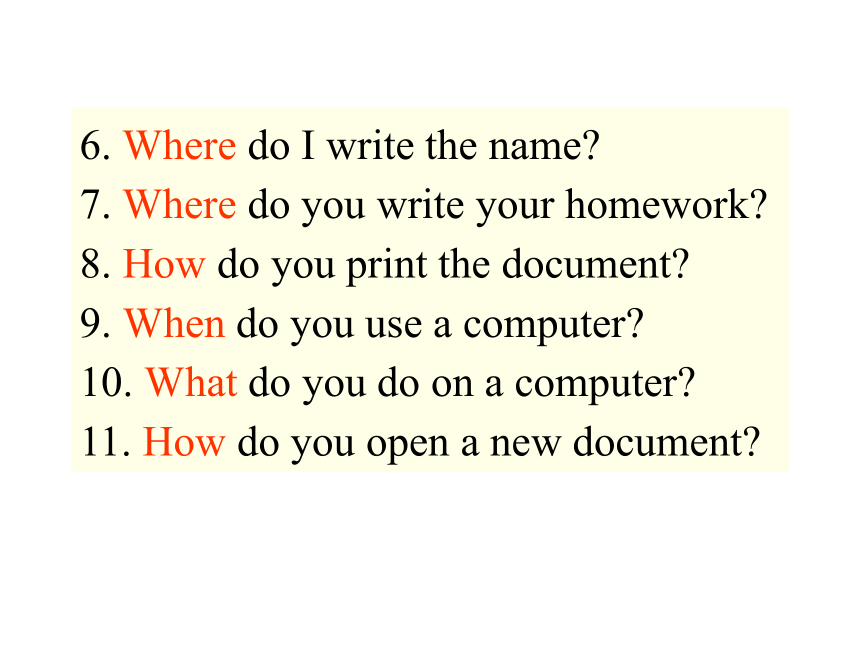
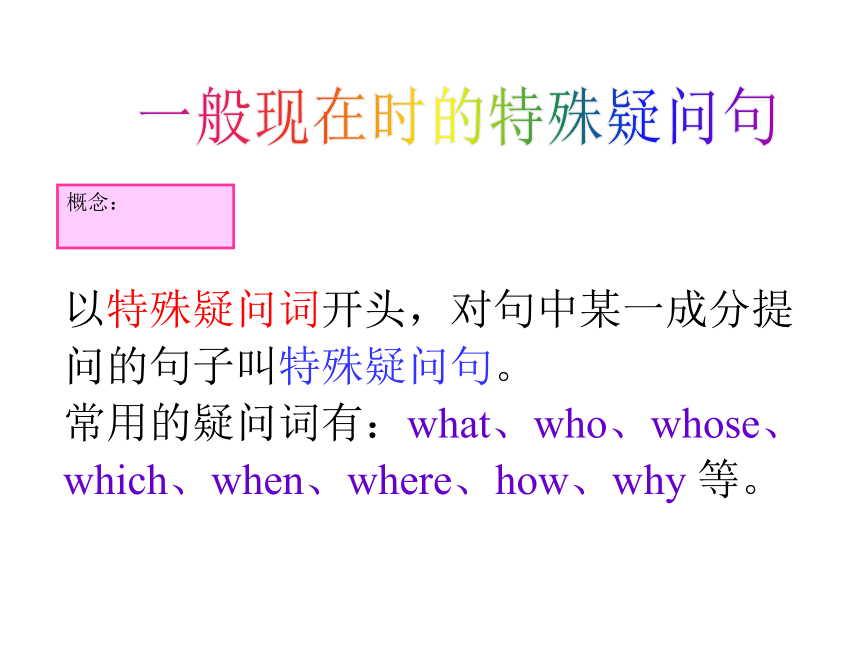
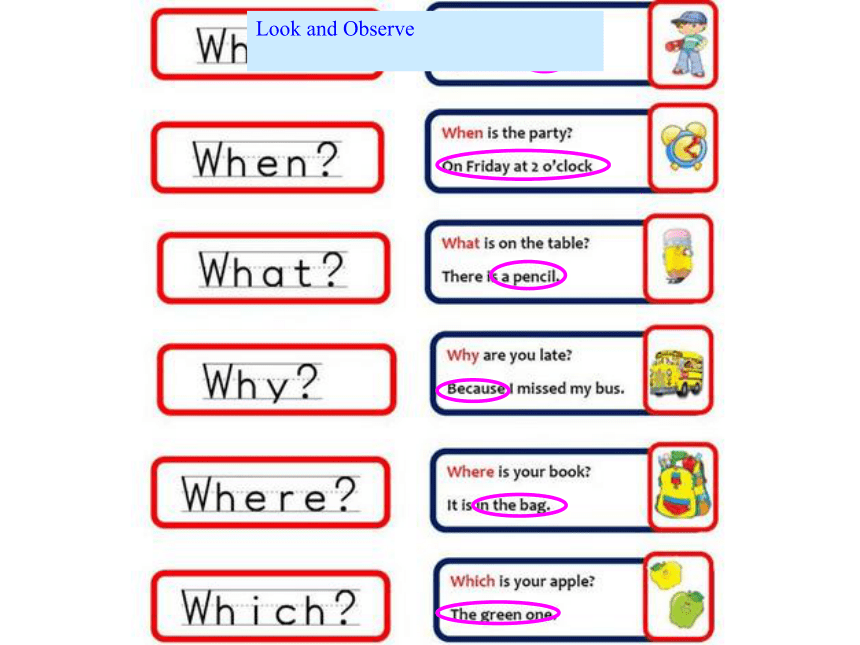


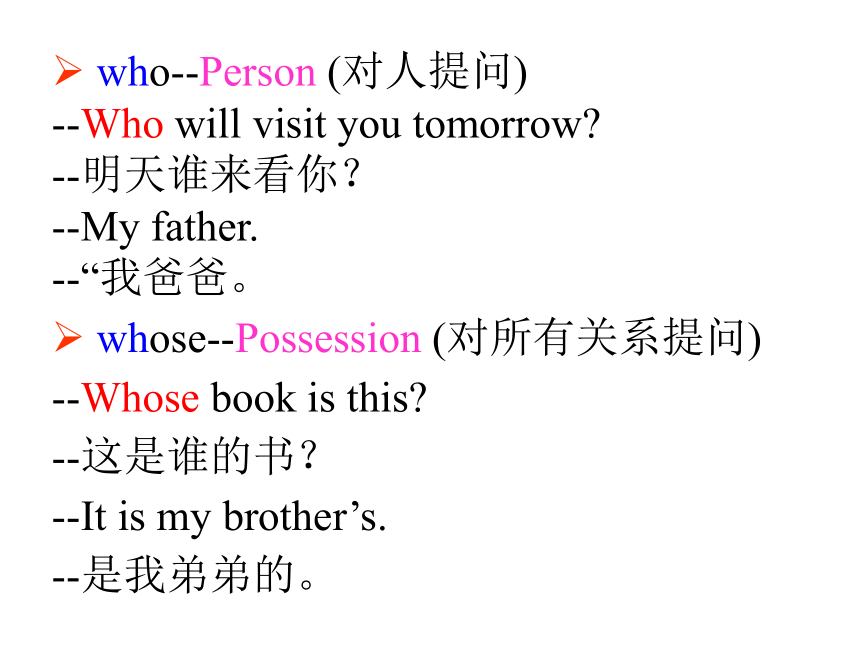

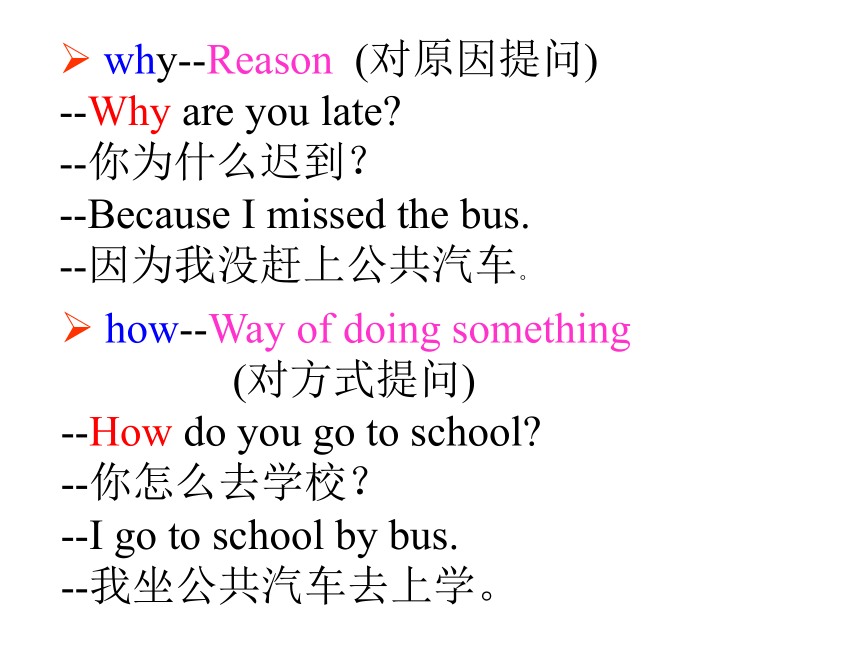
文档简介
(共20张PPT)
1. How do I write my homework on the computer?
2. How do I save the document?
3. Who are the boy and the girl in front of Paul?
4. What do I do next?
5. Which is Lingling the panda?
Observe
Observe the following sentences carefully and pay attention to the words in red.
6. Where do I write the name?
7. Where do you write your homework?
8. How do you print the document?
9. When do you use a computer?
10. What do you do on a computer?
11. How do you open a new document?
概念:
以特殊疑问词开头,对句中某一成分提问的句子叫特殊疑问句。
常用的疑问词有:what、who、whose、which、when、where、how、why 等。
Look and Observe
各种疑问词的用法:
what--Activity or thing (对行为和事物提问)。
1. --What are you talking about?
你们在谈什么?
--We are talking about our family.
我们在谈论我们的家庭情况。
2. --What is your name?
你叫什么名字?
--My name is Wang Li.
我叫王丽。
which--Thing or person (对特定的人或事物提问)。
--Which man is your English teacher?
--哪位是你的英语老师?
--The man in white.
--那个穿着白衣服的。
who--Person (对人提问)
--Who will visit you tomorrow?
--明天谁来看你?
--My father.
--“我爸爸。
whose--Possession (对所有关系提问)
--Whose book is this?
--这是谁的书?
--It is my brother’s.
--是我弟弟的。
when--Time (对时间提问)
--When will you finish your homework?
--你什么时候能完成作业?
--Tomorrow.
--明天。
where--Place (对地点提问)
--Where do you study?
--你在哪儿读书?
--In Shanghai.”
--在上海。
注意:what time与when 都可表示“什么时候”。
what time: 表示的时间比较精确,
指“几点钟”,“几时几分”;
when: 表示的时间范围广。
--What time does your mother go to work?
你母亲什么时候去上班? --She goes to work at seven.
她七点去上班。
2. --When will he come back? 他什么时候回来? --He’ll come back tomorrow. 他明天回来. ?
why--Reason (对原因提问)
--Why are you late?
--你为什么迟到?
--Because I missed the bus.
--因为我没赶上公共汽车。
how--Way of doing something
(对方式提问)
--How do you go to school?
--你怎么去学校?
--I go to school by bus.
--我坐公共汽车去上学。
How many/much--Numbers of things (对数量提问)
e.g. --How many lessons do you have today?
--今天你有几节课啊?
--I have six lessons today.
--今天我有六节课。
The family of “how”
How old--Age (对年龄提问)
e.g. --How old is she?
--她多大了?
--She is twelve.
--她12岁了。
How often -- (对频率提问)
eg. --How often does Mike go to the Reading
Club?
--迈克多久去一次读书俱乐部?
--Twice a week.
--一周两次。
How tall -- (对高度提问)
How long -- (对事物的长度提问)
…
1. I usually do my homework on the
computer at home.
2. I sometimes play Counter Strike and
Final Fantasy.
对划线部分提问。
What do you usually do on the
computer at home?
What games do you play sometimes?
3. I have breakfast at eight.
4. I want to make friends with you.
5. I come from USA.
6. I sleep eight hours every night.
How many hours/ How long do you sleep every night?
What time do you have breakfast?
Who do you want to make friends with?
Where do you come from?
Making a survey about computers
Step 1: Work in groups of three. Write questions about students and computers.
Do you play computer games at home?
What do you use your computer for?
Do you share your computer with your parents?
When do you use your computer?
Questions Name 1 Name 2 …
Do you have a computer at home?
Do you use a computer for your homework?
Step 2: Work with the whole class. Ask and answer questions in Activity 5, and make notes.
Step 3: Work in your group. Make a survey about students and computers. Use the notes you made in Activity 6 to help you.
Seven students have a computer at home. Five students use a computer for their homework …
一般现在时的特殊疑问句:
Wh-questions + 一般疑问句?
从方框中选出适当的句子补全对话。
A. What do you usually do on the
Internet?
B. What about your father?
C. Who often shares it with you?
D. Do you have any net friends?
E. How many computers are there in your home?
A: Hi, Mary. (1) ________
B: There is only one.
A: (2) ________
B: My father.
A: (3) ________
B: I usually listen to music.
A: (4) ________
B: He usually talks to his net friends (网友)
by QQ.
A: (5) ________
B: Yes, I do.
A: It’s dangerous to meet net friends alone.
You should tell your parents when you
want to do it.
B: I know, thanks a lot.
E
C
A
B
D
1. Review the grammar we’ve learnt today.
2. Finish the exercises in Learning English.
3. Preview the new words and expressions in Module 8.
Homework
1. How do I write my homework on the computer?
2. How do I save the document?
3. Who are the boy and the girl in front of Paul?
4. What do I do next?
5. Which is Lingling the panda?
Observe
Observe the following sentences carefully and pay attention to the words in red.
6. Where do I write the name?
7. Where do you write your homework?
8. How do you print the document?
9. When do you use a computer?
10. What do you do on a computer?
11. How do you open a new document?
概念:
以特殊疑问词开头,对句中某一成分提问的句子叫特殊疑问句。
常用的疑问词有:what、who、whose、which、when、where、how、why 等。
Look and Observe
各种疑问词的用法:
what--Activity or thing (对行为和事物提问)。
1. --What are you talking about?
你们在谈什么?
--We are talking about our family.
我们在谈论我们的家庭情况。
2. --What is your name?
你叫什么名字?
--My name is Wang Li.
我叫王丽。
which--Thing or person (对特定的人或事物提问)。
--Which man is your English teacher?
--哪位是你的英语老师?
--The man in white.
--那个穿着白衣服的。
who--Person (对人提问)
--Who will visit you tomorrow?
--明天谁来看你?
--My father.
--“我爸爸。
whose--Possession (对所有关系提问)
--Whose book is this?
--这是谁的书?
--It is my brother’s.
--是我弟弟的。
when--Time (对时间提问)
--When will you finish your homework?
--你什么时候能完成作业?
--Tomorrow.
--明天。
where--Place (对地点提问)
--Where do you study?
--你在哪儿读书?
--In Shanghai.”
--在上海。
注意:what time与when 都可表示“什么时候”。
what time: 表示的时间比较精确,
指“几点钟”,“几时几分”;
when: 表示的时间范围广。
--What time does your mother go to work?
你母亲什么时候去上班? --She goes to work at seven.
她七点去上班。
2. --When will he come back? 他什么时候回来? --He’ll come back tomorrow. 他明天回来. ?
why--Reason (对原因提问)
--Why are you late?
--你为什么迟到?
--Because I missed the bus.
--因为我没赶上公共汽车。
how--Way of doing something
(对方式提问)
--How do you go to school?
--你怎么去学校?
--I go to school by bus.
--我坐公共汽车去上学。
How many/much--Numbers of things (对数量提问)
e.g. --How many lessons do you have today?
--今天你有几节课啊?
--I have six lessons today.
--今天我有六节课。
The family of “how”
How old--Age (对年龄提问)
e.g. --How old is she?
--她多大了?
--She is twelve.
--她12岁了。
How often -- (对频率提问)
eg. --How often does Mike go to the Reading
Club?
--迈克多久去一次读书俱乐部?
--Twice a week.
--一周两次。
How tall -- (对高度提问)
How long -- (对事物的长度提问)
…
1. I usually do my homework on the
computer at home.
2. I sometimes play Counter Strike and
Final Fantasy.
对划线部分提问。
What do you usually do on the
computer at home?
What games do you play sometimes?
3. I have breakfast at eight.
4. I want to make friends with you.
5. I come from USA.
6. I sleep eight hours every night.
How many hours/ How long do you sleep every night?
What time do you have breakfast?
Who do you want to make friends with?
Where do you come from?
Making a survey about computers
Step 1: Work in groups of three. Write questions about students and computers.
Do you play computer games at home?
What do you use your computer for?
Do you share your computer with your parents?
When do you use your computer?
Questions Name 1 Name 2 …
Do you have a computer at home?
Do you use a computer for your homework?
Step 2: Work with the whole class. Ask and answer questions in Activity 5, and make notes.
Step 3: Work in your group. Make a survey about students and computers. Use the notes you made in Activity 6 to help you.
Seven students have a computer at home. Five students use a computer for their homework …
一般现在时的特殊疑问句:
Wh-questions + 一般疑问句?
从方框中选出适当的句子补全对话。
A. What do you usually do on the
Internet?
B. What about your father?
C. Who often shares it with you?
D. Do you have any net friends?
E. How many computers are there in your home?
A: Hi, Mary. (1) ________
B: There is only one.
A: (2) ________
B: My father.
A: (3) ________
B: I usually listen to music.
A: (4) ________
B: He usually talks to his net friends (网友)
by QQ.
A: (5) ________
B: Yes, I do.
A: It’s dangerous to meet net friends alone.
You should tell your parents when you
want to do it.
B: I know, thanks a lot.
E
C
A
B
D
1. Review the grammar we’ve learnt today.
2. Finish the exercises in Learning English.
3. Preview the new words and expressions in Module 8.
Homework
同课章节目录
- Starte
- Module 1 My teacher and my friends
- Module 2 My English lesson
- Module 3 My English book
- Module 4 My everyday life
- Module 1 My classmates
- Unit 1 Nice to meet you.
- Unit 2 I'm Wang Lingling and I'm thirteen years ol
- Unit 3 Language in use.
- Module 2 My family
- Unit 1 Is this your mum?
- Unit 2 These are my parents.
- Unit 3 Language in use.
- Module 3 My school
- Unit 1 There are thirty students in my class.
- Unit 2 The library is on the left of the playgroun
- Unit 3 Language in use.
- Module 4 Healthy food
- Unit 1 We've got lots of apples.
- Unit 2 Is your food and drink healthy?
- Unit 3 Language in use.
- Module 5 My school day
- Unit 1 I love history.
- Unit 2 We start work at nine o'clock.
- Unit 3 Language in use.
- Revision module A
- Module 6 A trip to the zoo
- Unit 1 Does it eat meat?
- Unit 2 The tiger lives in Asia.
- Unit 3 Language in use.
- Module 7 Computers
- Unit 1 How do I write my homework on the computer?
- Unit 2 When do you use a computer?
- Unit 3 Language in use.
- Module 8 Choosing presents
- Unit 1 I always like birthday parties.
- Unit 2 She often goes to concerts.
- Unit 3 Language in use.
- Module 9 People and places
- Unit 1 We're enjoying the school trip a lot.
- Unit 2 They're waiting for buses or trains.
- Unit 3 Language in use.
- Module 10 Spring Festival
- Unit 1 Are you getting ready for Spring Festival?
- Unit 2 My mother's cleaning our houses and sweepin
- Unit 3 Language in use.
- Revision module B
